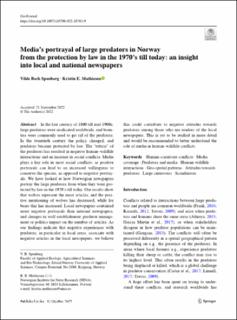Media’s portrayal of large predators in Norway from the protection by law in the 1970’s till today: an insight into local and national newspapers
Peer reviewed, Journal article
Published version
Permanent lenke
https://hdl.handle.net/11250/3036425Utgivelsesdato
2022Metadata
Vis full innførselSamlinger
Sammendrag
In the late century of 1800 till mid-1900s, large predators were eradicated worldwide, and bounties were commonly used to get rid of the predators. In the twentieth century the policy changed, and predators became protected by law. The “return” of the predators has resulted in negative human–wildlife interactions and an increase in social conficts. Media plays a key role in most social conficts, as positive portrayals can lead to an increased willingness to conserve the species, as opposed to negative portrayals. We have looked at how Norwegian newspapers portray the large predators from when they were protected by law in the 1970’s till today. Our results show that wolves represent the most articles, and the positive mentioning of wolves has decreased, while for bears this has increased. Local newspapers contained more negative portrayals than national newspapers, and changes in wolf establishment, predator management or politics impact on the number of articles. As our fndings indicate that negative experiences with predators, in particular in local areas, associate with negative articles in the local newspapers, we believe this could contribute to negative attitudes towards predators among those who are readers of the local newspapers. This is yet to be studied in more detail and would be recommended to better understand the role of media in human–wildlife conficts.
Beskrivelse
CC © The Author(s). 2022 Open Access This article is licensed under a Creative Commons Attribution 4.0 International License, which permits use, sharing, adaptation, distribution and reproduction in any medium or format, as long as you give appropriate credit to the original author(s) and the source, provide a link to the Creative Commons licence, and indicate if changes were made.

